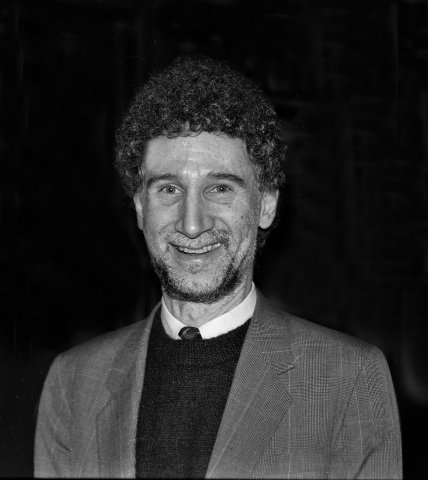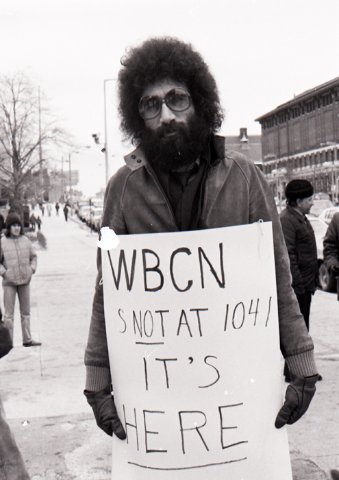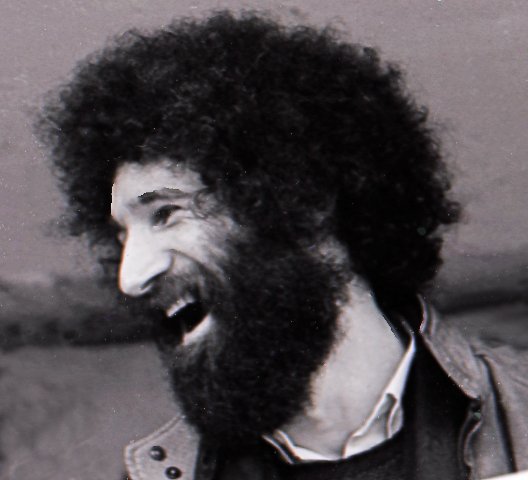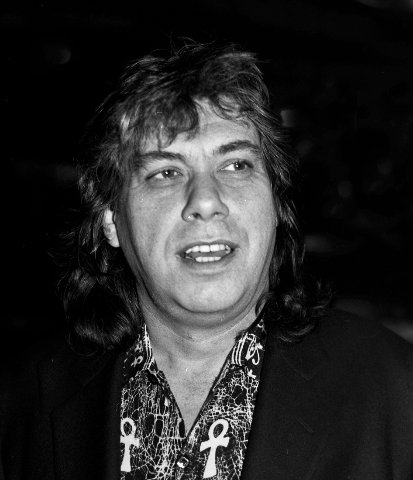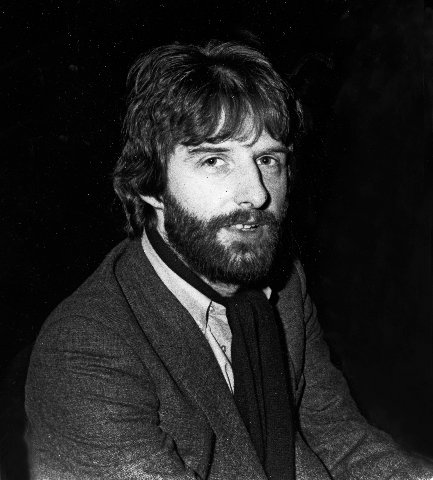Rock Archivist David Bieber Part Two
Boston Media and Counterculture
By: Charles Giuliano - Mar 09, 2019
This is part two of an extensive interview with rock archivist and visionary David Bieber. He played multiple roles in the counterculture of Boston. He started as a journalist reporting on music for Billboard Magazine. After graduate school at Boston University he became music director of its FM station WBUR. When BU president John Silber seized control and downsized the station Bieber took a job with an advertising agency focused on music and entertainment. From there he became creative director for WBCN and later worked with Stephen Mindich creating supplements and special projects for The Boston Phoenix and WFNX.
For his own interest and research he acquired a vast collection of publications, albums, promo items and memorabelia. Selections from the collection are on view at Boston's Verb Hotel and Wang Theater. With a small staff he is cataloguing and creating systemic access to the archive.
Charles Giuliano Talk to me about your archive.
David Bieber It was five years ago. The Phoenix had shut down and I was working with Stephen Mindich on his archive’s transfer to Northeastern University. He said to me as a boss, in a way that only a boss can say, although at the time he was not a boss of anything. He called to say “A meeting is set up with Steve Samuels and you are going to be there. Here’s the address.”
He was setting me up with somebody I hadn’t met previously. At that time, he was the owner of the Howard Johnson’s Motor Lodge Inn at 1271 Boylston Street. WBCN was formerly located at 1265.
They were creating the Verb Hotel which occurred during the spring and summer of 2014. We struck a five year deal which is now entering the 6th through 10th years of a contract expansion. I installed things that I had at home.
Steve sold him that “You have to meet David who has warehouses of things” which was true. But everything was on pallets with thirty to forty boxes on a pallet. They were shrink wrapped and with a fork lift put on shelves.
In Avon I had 230 pallets. They were completely useless to me other than the mental satisfaction that I had saved these things. If you saw my monthly rental bill it was brutal to be paying for something that was largely a mirage. Nobody had ever seen it or used it.
I was able to do the Verb Hotel based on the one tenth of one percent of works that I had in my house. They were things that made the cut to stay at home rather than go in boxes.
(From theVerb hotel's PR. "Are you ready to rock? Get ready for a music-inspired boutique hotel experience offering a retro-chic vibe with Rock & Roll artifacts and collectibles everywhere you look. Take a trip back to the 1960s and ‘70s with music infused into every detail of our unique retro hotel." )
In the past two years the owner in Avon reclaimed the space so I had to move. After extensive search, because space is so expensive in Boston, I found a place in Norwood. It’s twenty two minutes from my house in West Roxbury.
That started the process of unpacking and brought up the points you raise about, what to do with it, and who to entrust it to? Do I have to endow it? Will somebody buy it? I want to keep it together. There are no guarantees in life or after life but I would like to see these things go to people who will appreciate them. They should be used in concert with other things so that one plus one equals five.
There are places where that can happen. Laurie Anderson is working with her material at the New York Public Library. Her husband Lou Reed’s papers are at Yale which has Danny Fields material. The University of Tulsa has Bob Dylan’s papers along with Woody Guthrie’s. To varying degrees these things are a big deal. A couple of Dylan notebooks just went for twenty million dollars. A billionaire is seeing that Dylan’s stuff is co-mingled with Guthrie’s There was media coverage when the Danny Fields deal was done. They had his 16 Magazine material as well as all he had done with The Doors. He managed The Ramones. There were also x rated homoerotic films and Polaroids and where were they going to go? It is part of the individual landscape that goes to telling the complete story. The critical factors are space and rent. I am paying the freight and can still accommodate more content.
(Danny Fields (born Daniel Feinberg; November 13, 1939) is an American music manager, publicist, journalist and author. As a music industry executive in the 1960s, through 1980s, he was one of the most influential figures in the history of punk rock.)
A hobby has turned into a business as I do exhibitions and presentations that use the content. I’m delighted to share it for projects like the Wang Theatre and Verb Hotel. I’ve worked with the Antiquarian Book Fair, and Spotify. ( A digital music service that provides access to millions of songs). If I can pay the overhead, and keep three or four people working with me, then I’m delighted. I want to maximize the retrieval capability of the archive to get it out of boxes. We want it to be systemic so we can do the best possible exhibitions and presentations.
A part of that is being there to tell the story and back story behind each object. The key element is authenticity. We were there for the creation of these objects. That’s important. You can tell why this has meaning.
CG When did you connect with Stephen Mindich, (publisher of Boston After Dark/ Boston Phoenix)?
DB I met Stephen when I was working for Danny Lipman at Music Promotions which was in the same block as Boston After Dark. Music Promotions was a big advertiser with the paper.
When the Phoenix closed a big question was what would become of the archive. While I worked there, from time to time, file cabinets would get cleared out to make more space. I asked if I could have it.
They shut down the website and many writers were dismayed to find that, unless they kept hard copies, their work was no longer on line.
When Stephen was diagnosed with pancreatic cancer there was a discouraging prognosis. He survived longer than was expected. I was able to work with him to place the archive with Northeastern. His widow (former state Superior Court judge Maria Lopez ) had a big dumpster and was throwing out things. There is no way of knowing what of value was lost.
CG What was it like working at The Phoenix?
DB It was adventurous. Stephen and sales director Barry Morris, used all kinds of bribes like Sack Theaters movie passes to cultivate good relations with clients. It was like giving us gold.
Charlie McKenzie, before he co-managed Boston, was working for WEA (Warner Elektra Atlantic). He controlled the budgets and we were spending money like crazy. One year Charlie got a leather coat in appreciation of all the advertising dollars that he funneled to Boston After Dark.
There were skirmishes between the advertising departments of BAD and The Cambridge Phoenix. They were a viable publication with esteemed writers. The radio stations were also looking for advertising dollars.
(Mindich later acquired The Cambridge Phoenix for its name and writer George Kimball. While his intent was to eliminate competition the staff regrouped as a cooperative, The Real Paper, with Paul Solman as editor.)
WBCN was large at the time but there were other alternative and underground stations like WNTN in Newton. It was an AM station but they were also album oriented.
The names kept changing. WBCN went from being called underground, to progressive, to AOR (album oriented rock). Later on WBCN and WFNX (Phoenix) were competitive for the alternative category. The definitions changed but there were certain go-to stations. What was being played and the ads had local impact but also national and international.
I would do some writing for the Cambridge Phoenix helping with supplements they put out a couple of times a year. They were 48 pages and called The Earbook. They were devoted to music. I did a long profile of Scotty Brink, the program director of WRKO.
In 1972-1973 Paul Ahern was promoting Atlantic Records that had Asylum Records which was David Geffen’s label. There was a magic of what was playing on AM stations like WRKO because of the brilliance of Ahern’s promotional abilities. He had new releases from Eagles, Linda Ronstadt, Joni Mitchell as well as Tom Waits. They were getting Top 40 airplay which was a story unto itself.
So I wrote about Brink for The Cambridge Phoenix. At the same time I was working with Ben Gerson of Boston After Dark. We went to Marblehead and did an interview with George Martin who was producing Marblehead Messenger by Seatrain. We would go to NY and do an interview with Don Kirshner.
(In the fall of 1972, Kirshner was asked by ABC television to serve as executive producer for their "In Concert" series, which aired every other week in the 11:30 p.m. slot. The following September, Kirshner left to produce and host his own syndicated weekly rock-concert program called Don Kirshner’s Rock Concert. The last show aired in 1981, the year that MTV was launched.)
Boston After Dark was also creating supplements. They were cash cows. They ran sound equipment supplements twice a year. If you look at early issues of Boston After Dark they were four to eight pages. Later there were issues with four and six sections. The arts and culture department was flush and they were spending money to make money.
CG Given the demographics of the enormous college market a lot of money was being made in selling tickets to concerts and promoting the arts. The aesthetics of the period are my primary focus but there were hip capitalists making a lot of money. By comparison writers and DJs were just just getting by. That was a source of resentment on the part of arts workers. There were attempts to form unions at WBCN and The Cambridge Phoenix. That never happened under Mindich and his various papers or WFNX. You were unusual with a position somewhere between creative and management.
DB During that era it didn’t cost much to live in Boston. Particularly when what you enjoyed were gifts as part of the employment package. The record companies were buying concert tickets to support their acts. That’s different than today regarding tour support. Labels invested in the longevity of artists who had multiple album deals.
Today you might regard contracts as tying up artists for years but multiple album deals were customary. In the 1960s it was not unusual for groups to release two or three albums a year.
There were people who understood the hip capitalist aspect of things. Rent was $150 a month, an ounce of pot cost $25, a gallon of gas was thirty two cents. Money went a long way. You weren’t buying music because record companies were giving it to you. I don’t think we were concerned with saving so much as living large on other people’s money.
People who got promo records sold them to used record stores. I used to buy albums from DJs. I got promo copies from some but not all labels and I was building a comprehensive collection. Not just records, I was collecting promo kits and store display materials.
At WBCN I was creative services director. There was a guy named Stan Cornyn who was creative services director for Warner/ Reprise. He created sampler albums, and brilliant marketing strategies. Labels had an identity. Certain labels were deemed a failure like MCA which was known as Music Cemetery of America. On WEA (Warner Elektra Atlantic), with the autonomy of each component label, in some ways they couldn’t spend it fast enough. When I was with Music Promotions what we were spending through Charlie McKenzie was stunning.
Supporting acts resulted in coverage, reviews and airplay, which meant sales. It was a cause and effect relationship. I was glad to go along for the ride. I don’t know how people live in today’s economic model because it is so expensive. We had a social community, and a business community that interlocked with that. We were having wonderful times.
CG You mentioned that we have known each other for a long time.
DB We met around 1971 when you were writing for the Herald. I recall seeing you at the Music Hall leaving at 9PM where the Dead played until 11:30PM.
CG It wasn’t quite that bad. I never heard an encore. When the concert ended I would grab my date and run to the car. From there it was a rush to get to the Herald Traveler. You were composing a lead in your head and wrote 500 words with a midnight deadline. That day you filed body copy which was a place holder for the mailbag edition. Midnight was the first replate so that's when the review was dropped in. Often I went to Chinatown after filing and the papers were being dropped off as I left the restaurant. The type was so fresh that it was like reading braille. I would read my review and go to bed. Then I was back in the office at 10 AM. Often there were several from the arts desk meeting midnight deadlines for reviews. That rarely happens anymore. Berkshire Eagles reviews routinely run days after performances and opening nights. I still try to post by noon the next day.
The mailbag edition was so called because it was sent to the suburbs. Delivery trucks for the Globe and Herald also exchanged a bundle as a courtesy. If there was breaking news the other paper had a crack at the story. There was a famous incident when the Herald's legendary society writer, Rose Walsh, had a scoop. She was close to the Kennedy family and learned that Jackie was engaged to Aristotle Onassis. The editors created a fake front page which was delivered to the Globe. During replate they ran the scoop. It was too late for the Globe to catch a piece of the action. There was a big laugh about that at The Herald. It also highlights an era when there was real competition among newspapers. I scooped the Newport Jazz Festival riot. My colleague at The Globe, Ernie Santosuosso, covered the evening concert that never happened. We called him The Fox because of his nose for news.
DB We were tastemakers and gatekeepers. We were determining what got played on radio or ran in newspapers. At that time decisions were being made intuitively by individuals who knew the culture but had limited professional experience. Most of us were on the job for just a few years. We were young and astonished by how much money Paul Ahern and Charlie McKenzie made managing Boston. Charlie was paid seven figures to walk away. There was a lot of money floating around. It did not go unnoticed. Charlie had three homes. That showed that there was money to be made in rock and roll.
CG How did it end up for him?
DB Not particularly well. He was a wonderful, affable, friendly guy who came to a bad end.
CG He was the rock Gatsby of our time.
DB What you were doing at The Herald, Ernie Santosuosso and later Steve Morse at The Globe, was picking up on coverage of rock and pop culture in BAD and The Phoenix. The daily press wanted a share of that readership. You were notable for writing overnight deadlines while the weekly press had the luxury of a longer lead time and more column inches.
CG Ernie and I compared notes about our envy of that journalistic luxury. We were banging it out and they had a week to reflect and polish their prose. But I always preferred the instant impact and still do.
DB We were pumping out three ads in a week with a three person operation. Michael Fremmer used to do clever radio ads.
CG In addition to reviews during the week we also wrote a Sunday feature for the Show Guide tabloid insert. That doesn’t happen anymore. During one memorable streak I was in the paper every day for a month.
DB Writers are fighting for space as newsrooms and arts sections shrink for what’s left of print media.
We share a commitment to preserve the culture as you are doing with this book. Nobody mandated me to save ever issue of Billboard Magazine.
There was respect for the voice of that writer. When you read a critic’s year end top ten list it meant something. You paid attention when someone said this is a top ten album or movie of the summer. It meant something when that writer was quoted in an ad. Now, the bigger the words are, the smaller that attribution. They just went to sell you on the idea that this is the best, biggest and greatest. In reality, who is saying these words?
CG So much has changed. When I was freelancing I was assigned an interview/ feature on the Cars. They were recording Candy-O (1979). I visited them in the studio and they played the album in progress. My piece included hearing them early on when they were managed by Fred Lewis. The interview was with Ric Ocasek. The editor allowed him to see my story prior to publication. I was called in to see the text and all the lines that Ocasek crossed out. Censorship started with Rolling Stone when bands and their management were allowed to preview coverage. That killed the integrity of rock journalism and I stopped reading Rolling Stone. Instead of honestly and fairly covering the music, publications and journalists are sucking up to bands. I recall walking into the Green Room at The Tea Party, grabbing a beer, talking to Duane Allman, hanging out with Jerry Garcia, or smoking a joint with Joe Cocker.
DB There were no gatekeepers because we were all in it together. They needed our coverage as much as we needed access to them. The star making machinery took over. The marketing people are brokering access and relationships.
Dealing with publications labels demanded coverage of emerging bands as leverage for access to their top tier talent. The marquee acts are not aware that they are being used and exploited in that fashion. There are strange and insidious deals being made. Of course the readers have no clue what’s going on.
CG A friend was assigned to shoot The Isley Brothers for Rolling Stone. In their hotel room he blurted out that he had read the article. They refused to be photographed until Rolling Stone provided access to their coverage. In hindsight, the photographer should have kept his mouth shut. Only on the rarest occasion do I let a subject read a review prior to posting. For the sake of accuracy, it is more common with interviews, which has been the case for this book. You don’t want to be correcting mistakes after publication and I have to do my own fact checking.
DB Consider what’s been happening with Trump and The National Inquirer not that the publication enjoys any esteem. On the President's behalf they buy, catch and kill, negative stories. In come cases about potential criminal activities.
CG Trump is a protagonist in the mantra of fake news. Coverage for Fox and The Inquirer is initiated by the president.
DB Take Jeff Bezos (CEO of Amazon) as owner of The Washington Post and his ability to repress news. The public has no clue about what goes on behind the scenes. Traditionally, there was a firewall between management and editorial. Today it is too often breached.
Bieber interview Part One.

